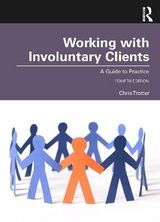
Working with Involuntary Clients
A Guide to Practice
Seiten
2015
|
3rd edition
Allen & Unwin (Verlag)
978-1-74331-353-4 (ISBN)
Allen & Unwin (Verlag)
978-1-74331-353-4 (ISBN)
- Titel erscheint in neuer Auflage
- Artikel merken
Zu diesem Artikel existiert eine Nachauflage
How do you help someone who has no interest in being helped? This book provides a practical guide to effectively working with individuals and their families in such areas as corrective services, child protection, mental health and residential care. Chris Trotter is Professor in Social Work at Monash University.
How do you help someone who has no interest in being helped?Social workers face particular challenges when working with involuntary clients who may be resistant or even openly antagonistic to the offer of assistance. This book provides a practical guide to effectively working with individuals and their families in such areas as corrective services, child protection, mental health and residential care.Chris Trotter's pro-social model shows how it is possible to work in partnership with involuntary clients and reconcile the two sometimes conflicting aspects of the role: the legalistic and the helping. Throughout the book the focus is on direct practice with guidance on clarifying roles, promoting pro-social values, dealing with issues of authority and establishing goals based on integrated, systematic and evidence-based approaches.Illustrated throughout with case examples, Working with Involuntary Clients has established itself as an essential guide for social work and welfare students and as an invaluable reference for professionals. This third edition has been fully revised and updated and includes new material on cognitive behavioural strategies and risk assessments.'
Since its first edition ...Working with Involuntary Clients has been the 'go-to' book for practitioners faced with that challenge. This new edition retains the key strength of its predecessors - it insists on clarity, on evidence and on usefulness - but it also adds new material on developing theoretical and practical approaches, making it an even more indispensable source for practitioners and researchers alike.' Fergus McNeill, Professor of Criminology and Social Work, University of Glasgow'This is an important book for anyone working with involuntary clients. It brings together research and practice, in very practical ways, across a range of settings. It will be valuable to practitioners, researchers and professionals interested in knowledge-informed practice.' - Professor Marie Connolly, Chair and Head of Social Work, The University of Melbourne
How do you help someone who has no interest in being helped?Social workers face particular challenges when working with involuntary clients who may be resistant or even openly antagonistic to the offer of assistance. This book provides a practical guide to effectively working with individuals and their families in such areas as corrective services, child protection, mental health and residential care.Chris Trotter's pro-social model shows how it is possible to work in partnership with involuntary clients and reconcile the two sometimes conflicting aspects of the role: the legalistic and the helping. Throughout the book the focus is on direct practice with guidance on clarifying roles, promoting pro-social values, dealing with issues of authority and establishing goals based on integrated, systematic and evidence-based approaches.Illustrated throughout with case examples, Working with Involuntary Clients has established itself as an essential guide for social work and welfare students and as an invaluable reference for professionals. This third edition has been fully revised and updated and includes new material on cognitive behavioural strategies and risk assessments.'
Since its first edition ...Working with Involuntary Clients has been the 'go-to' book for practitioners faced with that challenge. This new edition retains the key strength of its predecessors - it insists on clarity, on evidence and on usefulness - but it also adds new material on developing theoretical and practical approaches, making it an even more indispensable source for practitioners and researchers alike.' Fergus McNeill, Professor of Criminology and Social Work, University of Glasgow'This is an important book for anyone working with involuntary clients. It brings together research and practice, in very practical ways, across a range of settings. It will be valuable to practitioners, researchers and professionals interested in knowledge-informed practice.' - Professor Marie Connolly, Chair and Head of Social Work, The University of Melbourne
Chris Trotter is Professor in the Department of Social Work at Monash University and the author of Helping Abused Children and their Families and Collaborative Family Work.
Acknowledgements1 Introduction2 What works and what doesn't?3 Role clarification4 Promoting pro-social outcomes5 Problem-solving6 The worker-client relationship7 Working with families8 EvaluationAppendix: Principles of effective practiceReferencesIndex
| Erscheint lt. Verlag | 2.1.2015 |
|---|---|
| Sprache | englisch |
| Maße | 138 x 208 mm |
| Gewicht | 380 g |
| Themenwelt | Sozialwissenschaften ► Pädagogik ► Sozialpädagogik |
| Sozialwissenschaften ► Soziologie | |
| ISBN-10 | 1-74331-353-5 / 1743313535 |
| ISBN-13 | 978-1-74331-353-4 / 9781743313534 |
| Zustand | Neuware |
| Haben Sie eine Frage zum Produkt? |
Mehr entdecken
aus dem Bereich
aus dem Bereich
Grundlagen - Konzepte - Methoden
Buch | Softcover (2023)
Kohlhammer (Verlag)
CHF 47,60
ein Lehrbuch zum Kita-Management
Buch | Softcover (2023)
Kohlhammer (Verlag)
CHF 64,40
Orientierungswissen für die Soziale Arbeit
Buch | Softcover (2024)
Kohlhammer (Verlag)
CHF 49,95



